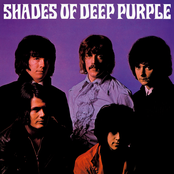Shades of Deep Purple

Biography
Deep Purple - Shades of Deep Purple (1968) From Wikipedia the free encyclopedia: Shades of Deep Purple is the debut album by English hard rock band Deep Purple, released in 1968 on Parlophone in the UK and Tetragrammaton in the United States. The album reached #24 on Billboard's Pop Album charts in the U.S. The song Mandrake Root would become an early concert staple for the band, with the keyboard and guitar solos extended at times for up to 15 minutes. A similar instrumental would be paire...
Deep Purple - Shades of Deep Purple (1968) From Wikipedia the free encyclopedia: Shades of Deep Purple is the debut album by English hard rock band Deep Purple, released in 1968 on Parlophone in the UK and Tetragrammaton in the United States. The album reached #24 on Billboard's Pop Album charts in the U.S. The song Mandrake Root would become an early concert staple for the band, with the keyboard and guitar solos extended at times for up to 15 minutes. A similar instrumental would be paired in later years with the extended live versions of "Space Truckin'." In the version of "Space Truckin'" recorded for the 1972 live Made In Japan album, a riff from "Mandrake Root" can be plainly heard during the instrumental parts. The first two or so minutes of the fourth track "Prelude: Happiness" is a direct translation of the first movement of Scheherazade. from "allmusic" Reviewby Bruce Eder The usual perception of early Deep Purple is that it was a band with a lot of potential in search of a direction. And that might be true of their debut LP, put together in three days of sessions in May of 1968, but it's still a hell of an album. From the opening bars of "And the Address," it's clear that they'd gotten down the fundamentals of heavy metal from day one, and at various points the electricity and the beat just surge forth in ways that were startlingly new in the summer of 1968. Ritchie Blackmore never sounded less at ease as a guitarist than he does on this album, and the sound mix doesn't exactly favor the heavier side of his playing, but the rhythm section of Nick Simper and Ian Paice rumble forward, and Jon Lord's organ flourishes, weaving classical riffs, and unexpected arabesques into "I'm So Glad," which sounds rather majestic here. "Hush" was the number that most people knew at the time (it was a hit single in America), and it is a smooth, crunchy interpretation of the Joe South song. But nobody could have been disappointed with the rest of this record — one can even hear the very distant origins of "Smoke on the Water" in "Mandrake Root," once one gets past the similarities to Jimi Hendrix's "Foxy Lady"; by the song's extended finale, they sound more like the Nice. Their version of "Help" is one of the more interesting reinterpretations of a Beatles song, as a slow, rough-textured dirge. "Hey Joe" is a bit overblown, and the group clearly had to work a bit at both songwriting and their presentation, but one key attribute that runs through most of this record — even more so than the very pronounced heaviness of the playing — is a spirit of fun; these guys are obviously having the time of their lives rushing through their limited repertoire, and it's infectious to the listener; it gives this record much more of a '60s feel than we're accustomed to hearing from this band. (The EMI/Spitfire re-release from 2000 is notably superior to any prior version of the CD, made from the original master tape (which had been sent directly to the group's American label, Tetragrammaton, leaving EMI with a vinyl dub, astonishingly enough), with textures far closer and crisper than have ever been heard before — there are also five bonus tracks, two very early outtakes from their earliest sessions, an alternate version of "Help," a BBC recording of "Hey Joe," and a searing live U.S. television performance of "Hush.") Track listing Side one 1. "And the Address" (Ritchie Blackmore, Jon Lord) – 4:38 2. "Hush" (Joe South) – 4:24 3. "One More Rainy Day" (Rod Evans, Lord) – 3:40 4. a) "Prelude: Happiness" (Evans, Blackmore, Nick Simper, Lord, Ian Paice) b) "I'm So Glad" (Skip James) – 7:19 Side two 5. "Mandrake Root" (Evans, Blackmore, Lord) – 6:09 6. "Help" (Lennon/McCartney) – 6:01 7. "Love Help Me" (Evans, Blackmore) – 3:49 8. "Hey Joe" (Billy Roberts) – 7:33 Bonus tracks on the CD re-issue 9. "Shadows" (album out take) (Evans, Blackmore, Simper, Lord, Paice) – 3:38 10. "Love Help Me" (instrumental version) (Evans, Blackmore) – 3:29 11. "Help" (alternate take) (Lennon/McCartney) - 5:23 12. "Hey Joe" (BBC Top Gear session) (Roberts) – 4:05 13. "Hush" (live US TV) (South) – 3:53 Personnel * Rod Evans - lead vocals * Ritchie Blackmore - guitar * Nick Simper - bass, backing vocals * Jon Lord - organ, keyboards, backing vocals * Ian Paice - drums Additional personnel * Produced by Derek Lawrence * Engineered by Barry Ainsworth * Bonus tracks recorded in 1968 & 1969 * Dedicated to Bobby, Chris, Dave and Ravel * Digitally remastered and restored by Peter Mew at Abbey Road Studios, London Read more on Last.fm. User-contributed text is available under the Creative Commons By-SA License; additional terms may apply.



